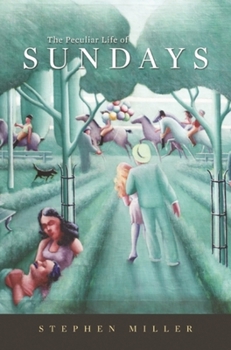Peculiar Life of Sundays
Select Format
Select Condition 
Book Overview
Sunday observance in the Christian West was an important religious issue from late Antiquity until at least the early twentieth century. In England the subject was debated in Parliament for six centuries. During the reign of Charles I disagreements about Sunday observance were a factor in the Puritan flight from England. In America the Sunday question loomed large in the nation's newspapers. In the nineteenth century, it was the lengthiest of our...
Format:Hardcover
Language:English
ISBN:0674031687
ISBN13:9780674031685
Release Date:December 2008
Publisher:Harvard University Press
Length:320 Pages
Weight:1.05 lbs.
Dimensions:1.0" x 5.8" x 8.4"
Related Subjects
Christian Books & Bibles Christianity Church History Historical Study & Educational Resources History History & Criticism Humanities Literature Movements & Periods Religion Religion & Spirituality Religious Studies Social History Theology World Writing Writing, Research & Publishing GuidesCustomer Reviews
2 ratings
Fascinating and Useful
Published by Thriftbooks.com User , 15 years ago
The book begins with what might be called a thematic chapter titled "Sunday Gladness, Sunday Gloom" that sets the tone of the discussion for the book. The second chapter gives a summary of Sunday in antiquity, focusing on Augustine. The bulk of the book is then devoted to looking at how Sunday was observed in England from the Elizabethan through the Victorian eras (chs 3-6) and in the USA from the colonial to the current period (chs 7-8). Miller concludes with a chapter on Sunday in the current American religious context. The novel, and most useful, aspect of Miller's approach is that he presents the practice of Sunday through the experiences of prominent writers who wrote about how they experienced and practiced Sunday. The writers from which he draws range from observant Christians such as William Law and Jonathan Edwards, to non-observant Christians (those who no longer worshiped, but had not publicly denied Christianity (such as Oliver Goldsmith and John Ruskin), to lapsed Christians such as Henry David Thoreau and Robert Lowell (those who were raised as Christians but as adults had publicly departed from the faith). This approach enables Miller to avoid the theological discussions and disputes, and focuses on how people actually practiced their Sundays. All in all, a well-written and helpful piece of work.
A sprightly work of synthesis
Published by Thriftbooks.com User , 15 years ago
Although this sprightly work of synthesis begins with a chapter on Sunday in antiquity, it is largely a study of Sunday observance in England and America from the Reformation to the present. With only a nod here and there to the Sunday behavior of ordinary people on the Christian day of rest, Miller largely treats the views about Sunday--expansively defined--of such influential individuals as Samuel Johnson, William Law, Joseph Addison, Jonathan Edwards, Oliver Goldsmith, Joshua Reynolds, John Ruskin, Henry David Thoreau, Wallace Stevens, Robert Lowell, and Walt Whitman. Miller is especially drawn to those, like Thoreau, who dabble in thinking of Sunday as the day of the Sun. Miller writes gracefully, defining his terms simply and usually without condescension. (Such is the current state of education that I cheerfully grant him considerable leeway along those lines in any case.) Occasionally Miller misses a source that might have provided a different perspective on one of his characters, such as Ann Twaite's Glimpses of the Wonderful: The Life of Philip Henry Gosse (2002). And Miller is overly anxious to broaden adherence to the Christian faith unless a character explicitly and determinedly announces his anti-Christianity. Finally, it seems to me that the line between Sabbatarian and non-Sabbatarian runs roughly along the divide between evangelical and non-evangelical, a possible delineation that Miller neither acknowledges nor challenges.





